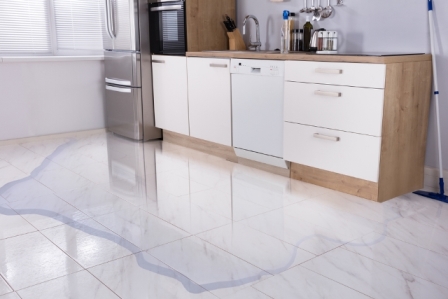We couldn’t live without water, yet too much of it – especially in the wrong place – can cause major damage. Water damage is a common cause of home and condo insurance claims. It’s a constant threat, and avoiding it requires constant vigilance.
Water damage can cause major losses.
How much damage can a little water do? A lot, actually. Wood and drywall can rot. Metal can rust. Carpet, furniture and personal belongings can be ruined. And if the moisture isn’t completely removed in time, mold and mildew can flourish, turning your home into a toxic environment.
According to the Insurance Information Institute, ISO data from 2013 to 2017 shows that water damage and freezing claims were the second most common type of homeowners insurance loss, after wind and hail damage. The average claim cost was $10,234.
Repairing water damage is expensive and time consuming. Prevention is the best method.
Appliances are a source of hidden dangers.
What do your dishwasher, your washing machine and the ice maker in your refrigerator all have in common? They use water, and because of this, they can contribute to water losses. Toilets, sinks, garbage disposals and other appliances that use water can also be a source of damage.
- Think of all the vibrating and spinning your appliances use to get your stuff clean. If a hose wears down or comes loose, it’s easy to see how water can get everywhere. Inspect your hose connections diligently for damage.
- Avoid running the dishwasher or washing machine when you’re not home. If something goes wrong, you want to be there to catch it.
- Don’t abuse your appliances. Garbage disposals aren’t trash cans. Avoid dumping grease, which can lead to clogs, as well as other items that could coagulate or clump. Your toilet shouldn’t be used as a trash can, either. Even wet wipes, which don’t dissolve as easily as toilet paper, can lead to clogs.
- Materials don’t last forever. Stainless steel sounds durable, but a stainless steel mesh supply line will only last for roughly five years. Yours may fail sooner, so keep an eye on it. Also be careful to purchase high quality parts from reputable sources. U.S. Customs can only inspect a small fraction of goods coming into the country, and items can be counterfeited.
- If you have a shared water system, you can’t shut off the water when you go on vacation. You can, however, turn off the water supply to appliances such as your washing machine when you’re away, or even just when you’re not using them.
- Consider installing water sensors near major appliances. They monitor your home for leaks and alert you immediately to any problems.
Water threats never end.
Using a water loss prevention checklist twice a year is a good start, but it’s not enough. Water issues can strike at any time, and it doesn’t take long for a small problem to grow into a big one. In addition to regular inspections, keep a constant eye out for issues and fix them immediately. Here are three clues that something could be wrong:
- Sounds: That little drip, drip, drip isn’t just annoying. It can cause big trouble if it’s not fixed immediately.
- Changes: Have you noticed condensation, water stains, warped flooring, warped drywall or a musty odor? What about moist, cool spots on your floor or an accumulation of salt deposits on your stone surfaces? You could have a leak.
- Water bill: Watch out for an increase in your water bill and monitor your water meter for unexpected increases or water usage when you’re not running water.
Even with these preventative efforts, you may someday face a water loss. If you do, you may need to shut off the water to contain the damage. Many condos use shared water systems. Know where the water shut off valve is in case of an emergency, as well as how to get permission to shut off water for repairs.
Finally, be sure to update your homeowners or renters insurance policy each year to ensure your coverage is robust. Contact your independent agent to learn more.
For more water damage prevention tips, click here.

